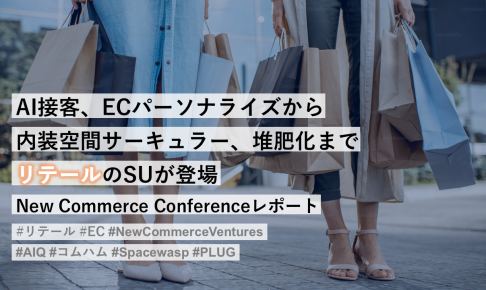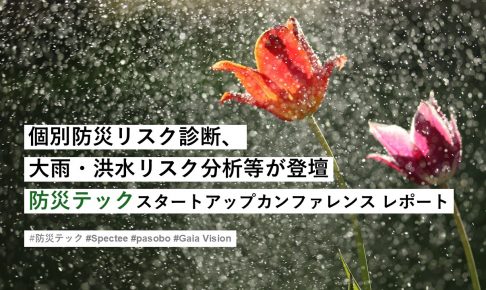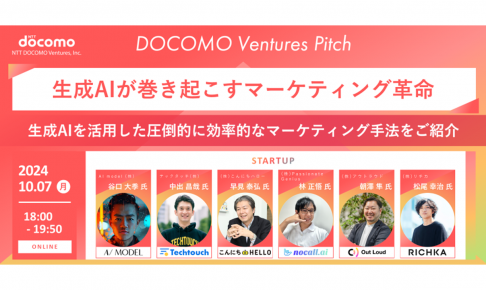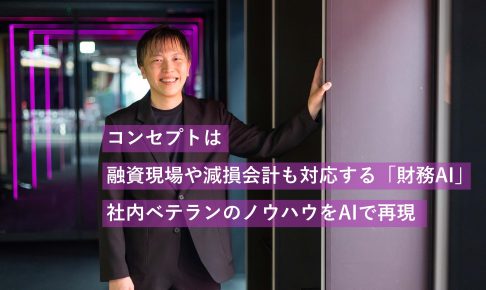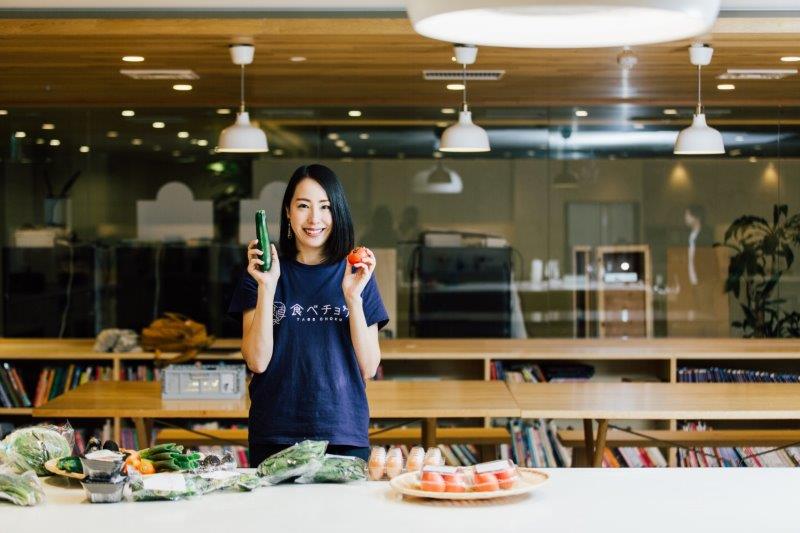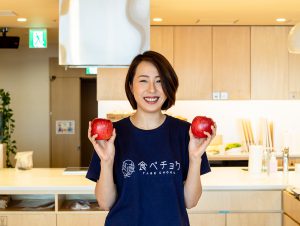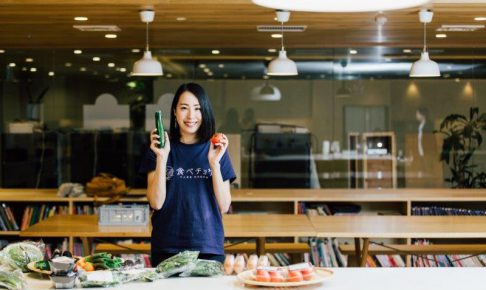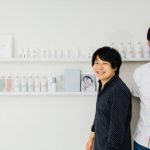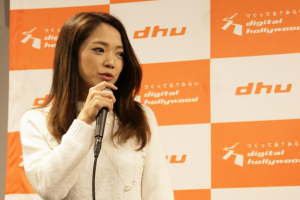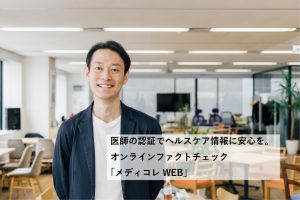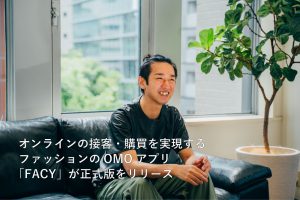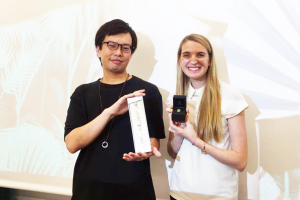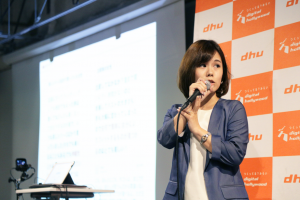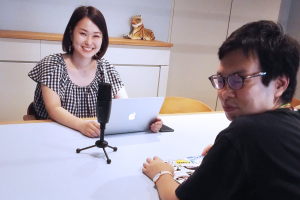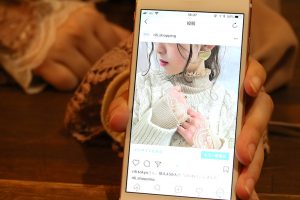A series [SEQUEL] that tells the story of the startup introduced by pilot boat. This is an online Marche eating chalk.
Eat choku which can purchase discerning ingredients directly from producer. In addition to choosing your favorite vegetables, a function to send recommended vegetables and fruits by subscription has also been launched for consumers and restaurants. At the time of the last interview, we only handled agricultural products, but we have recently started handling meat, fish and sake.
From the last service update to the future of using data to support producers, we talked to Mr. Akimoto, CEO of Vivid Garden, which runs the eating chalk.
(Interview: November 2019)
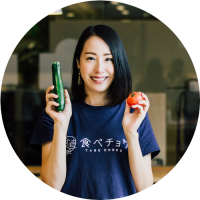 Vivid Garden Co., Ltd.CEO Rina Akimoto (Akimoto Rina)
Vivid Garden Co., Ltd.CEO Rina Akimoto (Akimoto Rina)
Born to farmers in Sagamihara city, Kanagawa prefecture. After graduating from Keio University of Science and Technology, joined DN Corporation. Director of web service, sales team leader, after experiencing the launch of new business, appointed advertising producer of smartphone application. Founded vivid garden in November 2016.
A mechanism to deliver vegetables directly from the farm to consumers and restaurants
"Eat Chok" is an online marketplace where discerning producers gather and is a marketplace where consumers can order food directly from producers. Farmers eat vegetables and fruits that they are particular about and exhibit them in chalk. When consumers buy, farmers send fresh, fresh vegetables directly from the farm.
Many existing agricultural distribution systems are designed for large-scale farmers. For example, it is a rule that the same product must be sold at the same price. In other words, farmers who produce with a focus on taste, quality and fertilizer cannot reflect their efforts on prices. Even with such a farm, if you use eat chalk, you can set the price freely and sell it because you do not have to go through the existing distribution.
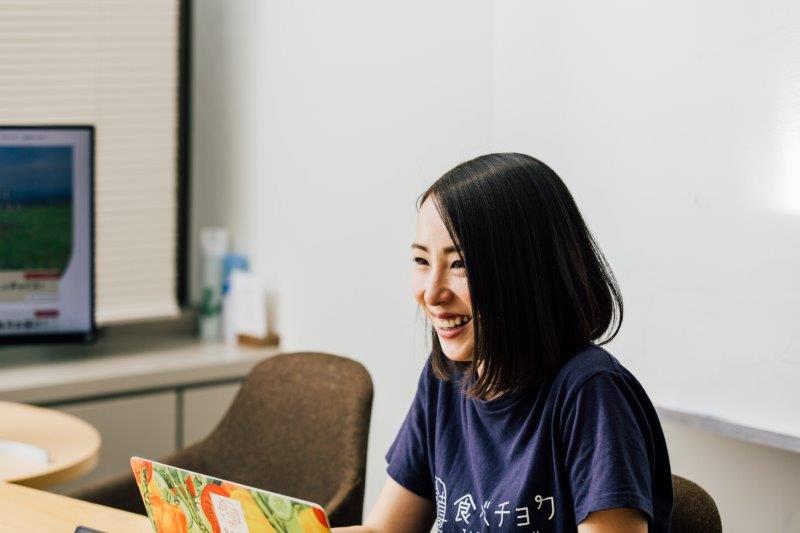
In addition, Vivid Garden is a vegetable subscription for “Eat Choke” purchased each time. Eat chalk concierge Expand. Because normal eating chalk is a marketplace, there are a certain number of users who say, "I don't know which farmer to buy," or "It's hard to choose." Vegetables are a commodity that is often purchased, so it is hard to choose each time. In that regard, the “Eat Chok Concierge” is a service where the Vivid Garden selects and sends the farmers and vegetables that match the user's preference within the range of a certain amount.
When using the Eat Chok Concierge, we ask a questionnaire in advance about the hated vegetables, well-prepared dishes, frequency, and rare vegetables, and select farmers and vegetables accordingly. The user can send feedback each time they send it, and it also responds to detailed needs such as "I do not need potatoes next time because there are still lots of potatoes" and "I do not hate this but do not put it in." As a result, the Eat Choke Concierge boasts a high 90% continuation rate the following month. Many users say that they received a vegetable they wouldn't buy on their own.
In addition, the fruit version of the eating chalk concierge " Eat chalk fruit select "Will also be available from October 2019. The release is based on voices such as “I want to deliver fruits at a fixed price” and “I want to send seasonal fruits to my parents' home” while running the Tabechok Concierge. Next is "Eat Chok Pro". It is a service that makes the eating chok concierge mechanism for restaurants.
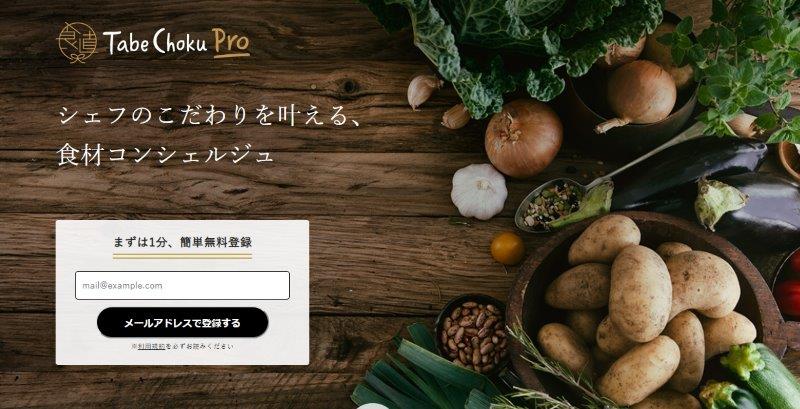
(image: Vivid Garden)
The need to obtain fresh organic vegetables from producers is naturally high not only at consumers but also at restaurants. However, it is troublesome for a restaurant to come randomly with vegetables. Therefore, in the eating chok pro, Vivid Garden selects a farmer and sends vegetables that can be purchased in a certain amount to restaurants.
In the first place, if a restaurant tried to purchase vegetables that were particular about it regularly, it was only possible to connect with the producers directly and purchase them. Although the EC purchasing system for vegetables has been set up, there are issues such as the lack of direct delivery from the production area and the fact that it takes too much time for restaurants to choose their own vegetables every time. Eat Choku Pro solves these problems.
The top priority for restaurants is to attract customers. So procurement tends to be second only. Checking for information and interacting with producers can be quite time-consuming. If it is Eat Choku Pro, it is sent directly from the production area, and since it is a concierge format, matching ingredients are sent without any hassle. This is an advantage for restaurants. (Mr. Akimoto, and so on).
Many users of Eat Chok Pro say "French and Italian restaurants that are particular about ingredients", "Cafes that offer organic cafes and salad bars", and "Juice stores such as cold pressed juices". In particular, cold pressed juices are often organic. The quality is high because it is made into juice, but it is out of shape. It would be a welcome sale that could increase profits as a farmer.
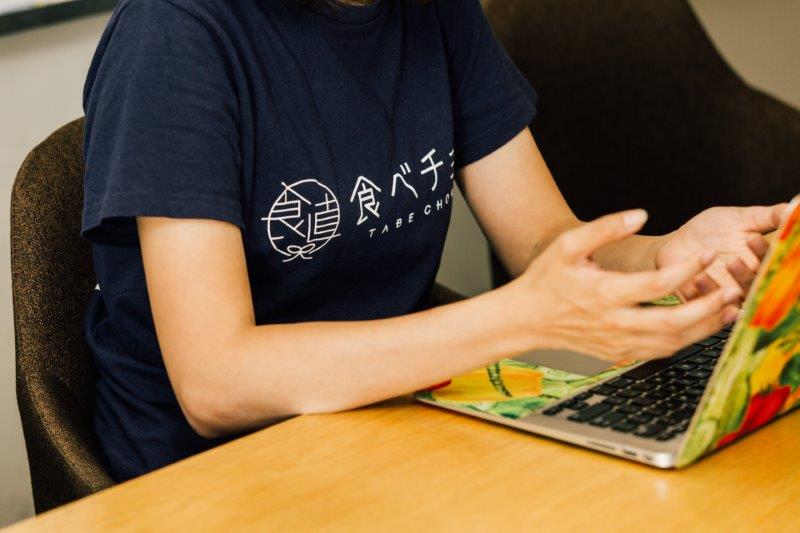
New release of meat, fish and sake
In July 2019, Vivid Garden released “Meat Choke”, “Fish (Wolf) Choke” and “Sake Choke”. As the name suggests, it is a meat, fish, and sake version of “Eat Choku”. Meat chalk handles livestock products such as beef and pork, and fish chalk handles marine products such as tuna, sea urchin, and seafood.
Started handling meat and fish at the marketplace for eating crops, "Eat Choku"
https://prtimes.jp/main/html/rd/p/000000014.000025043.html
Originally, we planned to handle non-vegetables such as meat from the timing of launching “Eat Choke”. So the service name is "Eat Choke" instead of "Beji Choku".
I had the idea, but it was difficult to sell vegetables during the interview, so I decided to start with vegetables.
According to Akimoto, if vegetables, meat, fish, and sake are lined up, meat and fish will inevitably be noticed. If all started side by side, meat and fish would stand out and vegetables would not be bought much. It is said that the servants came in from vegetables and released meat, fish, and sake late this time.
There may also be issues with purchase frequency. For example, fish have seasonal seasons, so if you buy each season, such as "Let's order oysters for the season", the number of transactions will decrease. If it were a choke that adopted a commission model, it could be inferred that there was a business-like decision to first verify vegetables that would be purchased more frequently. Of course, there may be circumstances where Mr. Akimoto was from a vegetable farmer and the issues were clear. This time, the concierge and other mechanisms mentioned above have been put in place, and a system has been created for regular purchases of vegetables, so the service has been extended to meat and fish.
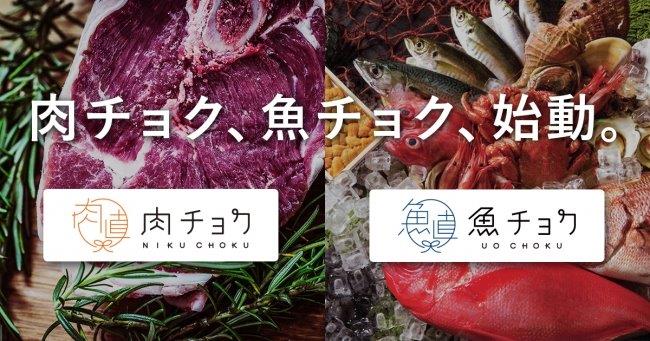
(image: Vivid Garden)
Just as Vivid Garden restricts vegetables to organic ones, it also has policies for meat, fish and sake.
Eating chalk standard
https://www.tabechoku.com/tabechoku_standard
Meat chalk handles livestock meat raised in an appropriate barn environment, using as little hormonal drugs and antibiotics as possible. There are few businesses that sell meat directly to consumers, especially due to the distribution structure. That's why it is important to sell safe meat directly with eaten chalk.
The characteristic of fish chalk is "sustainable fishing". The more the SDGs have the item "Protect the richness of the sea", the more environmental pollution of the sea has become a global issue. In order to protect marine environmental resources, it is important to tackle sustainability by not overfishing and avoiding fry that disrupts ecosystems. Based on these facts, fish chalk imposes standards such as handling fish only by producers engaged in sustainable fisheries and not using chemical treatment or chemical feed. Sake chalk is based on the fact that the ingredients are organic and contain no additives.
Leverage data for production
In the future, eating chalk may be able to use data for production. In fact, Akimoto says, "We have to think about how to use data."
For example, agriculture. Of course, restaurants often want vegetables right now, but it's not unusual to decide on a menu one month later, or to think of a seasonal menu a few months ahead of a luxury store. Therefore, there is a need for restaurants to know what vegetables are on the market in the future. However, farmers who produce vegetables are not always able to produce vegetables to meet their needs.
In this respect, eating chalk has data on when each farmer's vegetables were produced and when they were shipped, so it is possible to predict which crops will be shipped and when next year. The data can be used to guide restaurants to future vegetables.
Producers, of course, also manage shipping, but it is not unusual for management to be handwritten or to provide only a schedule until next week. Therefore, it can be said that scheduling with eating chalk is adding value to both producers and restaurants.
In addition, the launch of the Eat Choke Concierge will allow consumers to obtain taste data. It can be used in production planning, and as a consumer it is a pleasure to recommend “the vegetables I ate last year”.
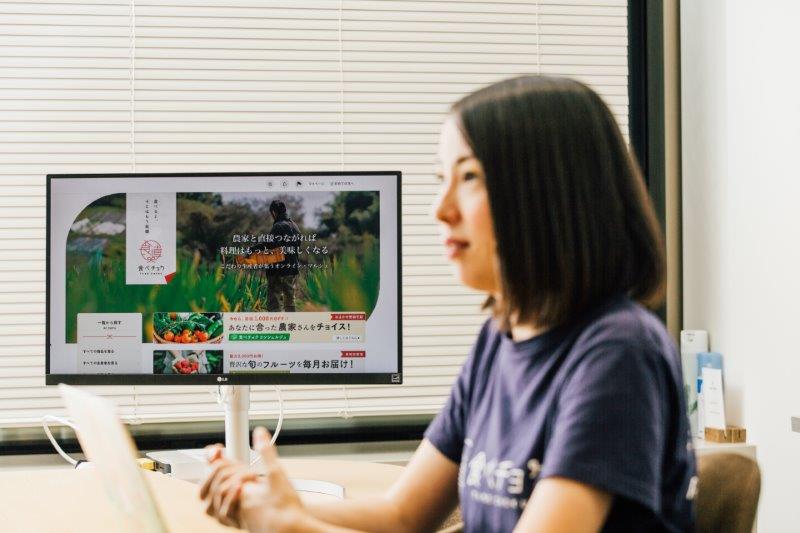
Eat chalk is characterized by the fact that producers are more likely to receive feedback because the producers are directly connected to consumers and restaurants without intermediate distribution. "I'm worried about what to make." (Akimoto) This is a mechanism that helps farmers.
In the eating chalk, for example, a restaurant that bought vegetables asked, `` This is really delicious, so I want to buy a lot, '' and in response, a farmer said, `` I had only made a little until now, but next year I'll increase the amount a little more. " This kind of communication is unlikely to be created in the middle of distribution, and the direct sales system based on eating chalk is creating a system that turns farmers' PDCA.
Farmers are a special industry where they can only perform PDCA 40 times in 40 years. Under such circumstances, many producers who have registered for "Eat Choku" and want to sell directly have a high motivation, especially for younger people, and have an ambition to improve their products. Every year I try to make new things and miss out on one PDCA opportunity. I want to contribute the eating chalk mechanism there.
In addition, the consumer direct sales system is also branding for producers. Actually the writer also bought vegetables with chalk, but there is a pamphlet saying `` I am such a farmer '' and a letter for buyers, so it is a bit different from buying vegetables bought at a supermarket I tasted the experience. It seems that such knowledge is also shared with producers as eaten chalk.
Affiliated with U.S. distributor
Vivid Gardens announced Series A finance in October 2019 for a total of 200 million yen. Although it is sourced from VCs and angels, shareholders are named Shinmei Holdings (hereinafter Shinmei). The company is a US distributor based in Kobe. This is the first time Vivid Garden has an agricultural business company as a shareholder.
The external environment surrounding agriculture is changing steadily, such as an increase in direct sales transactions between producers and farmers (off-market distribution), the use of robots for production, and the revision of the Wholesale Market Law. Under such circumstances, the two companies will collaborate, and in the future Vivid Garden will want to use Shinmei's know-how in leveraging logistics as producers expand, and Shinmei wants to leverage Vivid Garden's knowledge when converting business to IT. According to Akimoto, the partnership was reached.
In fact, rice is heavy for shopping, so it is more compatible with EC than vegetables and so on, so it is more compatible with eating chalk. The company is also considering a rice sales test in the eaten chalk.
In addition, by cooperating with Shinmei as an eating chalk, not only can we expect an increase in producers, but for example, we may be able to make a "taste evaluation of rice". If the rice registered in the eaten chalk can be displayed as to whether it is “sticky” or “plain”, it will be possible for consumers to enjoy and select rice. In fact, there are also niche rice registrations in eating chalk, so if it is combined with taste evaluation, it will be easier to promote the appeal of the rice.
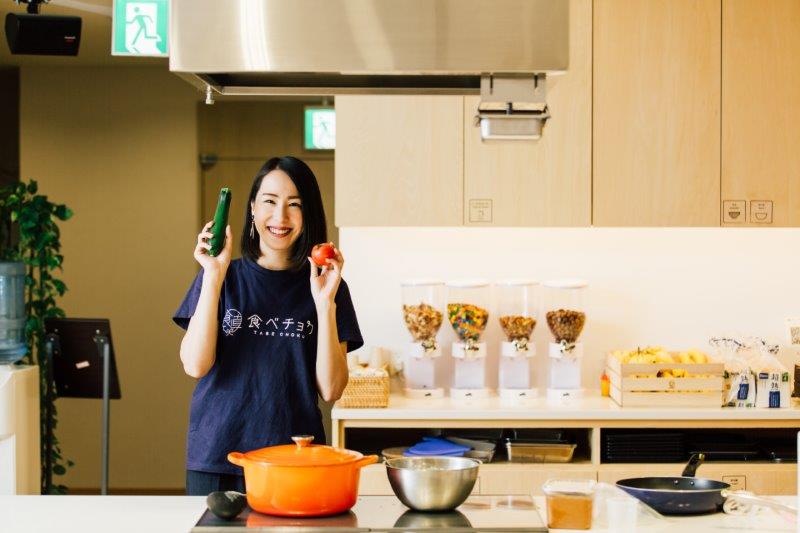
[Postscript]
The primary industry is a slow-moving territory, just as agriculture has the chance to use the PDCA only once a year. In addition, there is one aspect that the more you stick with the existing mechanism, the more you lose.
But with the need for transparency, traceability, and storytelling, the value of organic vegetables and environmentally-friendly products must have naturally increased. Now that the EC environment has been set up, eating chalk is delivering such valuable products to consumers.
Tabechok will use data to support producers in the future. Primary industries are still far behind in data utilization (although few are advanced), which is why their value is high.
Eat chalk that creates new measures one after another for producers and consumers. I want to look forward to the future of production created by eating chalk.
Interviews are also available on podcasts
Production team
TEXT
peitaro/ Notomi Hayabusataira (Notomi Jumpei)
Joint company pilot boat Representative employee CEO
Born in 1987. Graduated from the School of Business Administration at Meiji University and completed the Graduate School of Accounting at Waseda University. Passed the Certified Public Accountant exam while in school. After engaging in accounting audits at a major audit firm, he joined a venture support company and produced over 300 pitch events. Independently established a pilot company, pilot boat, in 2017 and continued to work on venture support. The company operates its own media “pilot boat”, which introduces startups in long form, toC venture presentation event “sprout”, and other startup events. He specializes in lifestyle, culture, and toC services including fashion, beauty, and technology. He also works as a start-up and innovation writer in various media, as well as open innovation consulting for major companies.
Twitter: @jumpei_notomi
PHOTO
Daisho Morita (TAISHO)
Photographer / Video writer
[Photo] Photographs mainly of people, such as magazines and web advertisements. He also shoots a lot of event photos and company hiring photos (Wantedly etc.).
[Video] There are many documentary videos and make-up videos for companies, and shooting using a drone is also possible. (CM shooting, etc.)
[Awards] "The new generation digital photo contest 2013"
For the latest information on LINE
When the latest articles are delivered, they will be announced on LINE.


